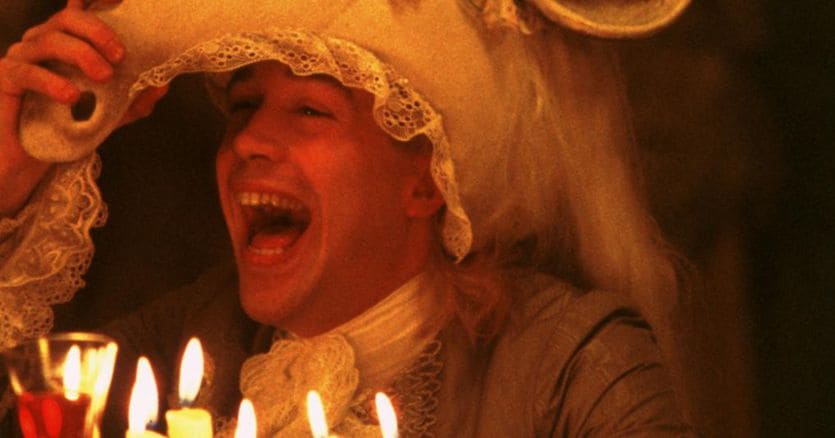Listen to the audio version of the article
The beautiful recent custom of having a group like the Orchestra of S. Cecilia play the soundtrack of a film being projected returns to the Roman Parco della Musica; this year the choice fell on the Oscar-winning “Amadeus”, by Miloš Forman. In Naples, however, we completely change the atmosphere, with the musical theater of one of the richest and most original authors of our twentieth century, Raffaele Viviani (1888-1950).
Roma
On 4-5-7 the film “Amadeus” by Miloš Forman will be screened at the Music Park, with the soundtrack performed by the S. Cecilia Orchestra and Choir. The film focuses on the last years of the life of Mozart (played by Tom Hulce), whose career is retraced from his position at the Salzburg court of Archbishop Colloredo to his premature death, passing through the imperial commissions, the relationship with Salieri (played by F. Murray Abraham) and the alternating fortunes of successes and failures. In 1985 the film won numerous awards, including eight Oscars (for best director and best leading actor, among others), the Golden Globe, the David di Donatello and the Nastro d’argento; while the soundtrack CD won the Grammy Award, again in 1985. The soundtrack features many famous music taken from the operas “Don Giovanni”, “Il ratto dal serraglio”, “The Marriage of Figaro”, “The Magic Flute”; and also from the Wind Serenade “Gran Partita”, from the Mass in K 427, from the Piano Concertos K 482 and K 466, from the Requiem. On the podium the Swiss director Ludwig Wicki, already a guest of the Academy in 2018.
Napoli
On 5-6-7-12-13-14 at the Trianon Theater two one-act plays by Raffaele Viviani, “O cafè ‘e notte e ghiuorno” and “’Nterr’ ‘a ‘Mmaculatella”. Nello Mascia stages two one-act plays, from 1919 and 1918 respectively, in which the great playwright from Stabia presents characters from various social backgrounds in a tragicomic way. In the first, the public hall of the café provides Viviani with the pretext to be able to exhibit transversally, and indirectly, a whole series of musical pieces, the complexity of which (think of the character of Celeste) far exceeds the representation of a simple showcase of “numbers”. The second is set at the Scalo Marittimo, on the drama of Italian emigration at the beginning of the twentieth century, in which different worlds, characters, situations crowd together, for each of which the departure, the detachment, the separation takes on a meaning and a face of its own. Viviani structures this diversity in three different moments, differentiated with respect to the dramaturgical function. The first is represented by the Emigrants, those who leave “out of necessity”; the second by those who leave “for pleasure” (Sasà and Zazà); and finally by those who remain and derive their precarious sustenance, singing the beauties of the city: the valets. The score of this one-act represents a point of acquired maturity in the conception of early Viviani’s musical dramaturgy. The central principle that globally structures this work is that of the functional combination of different musical forms and matrices.
One of the richest and most original artists of our twentieth century, Viviani (1888-1950), if on the one hand he belongs to the Neapolitan theatre, for the complex of situations represented fits into a tradition of European scope. His plays do not only show us the cruelty of a world that is heading towards decline, but, in their melancholic disenchantment and in the feeling of restlessness and precariousness of the protagonists, they mark the suspension of the tragic, the impossibility of any catharsis of contemporary world. Viviani takes up and mimics the great tradition of dialect theatre, but plays with it internally, draining it of all rhetoric and subtracting it from realism with a language reduced to pure essentiality and abstraction modules of singular impact.
Roma
From Monday 8 January at 12.00, 700 free tickets can be booked for the exceptional concert on 29 January by the Chicago Symphony Orchestra conducted by Riccardo Muti, which will be held at the Teatro Costanzi. This possibility is offered by Banca del Fucino, on the occasion of the centenary of its foundation. The Bank is a patron of the Rome Opera Foundation; so for this special concert and in line with its commitment to relaunching and enhancing the capital’s artistic scene, it is making free tickets available, 110 of which are intended for high schools that usually participate in the Theatre’s activities. Tickets can be obtained exclusively by registering and connecting to the Ticketone page of the Concerts of the Teatro dell’Opera di Roma. The program features music by Liadov, Stravinsky, and the poem “From Italy” by Richard Strauss.
